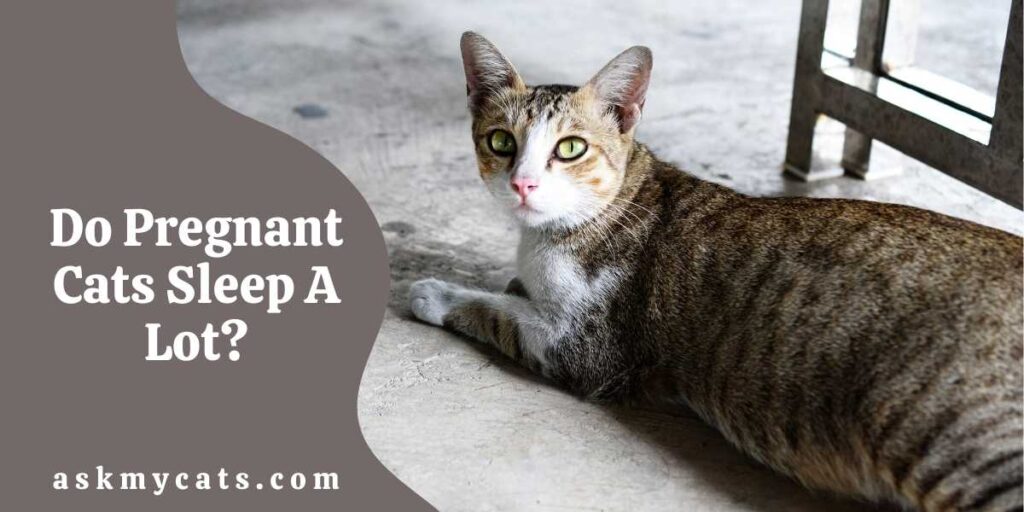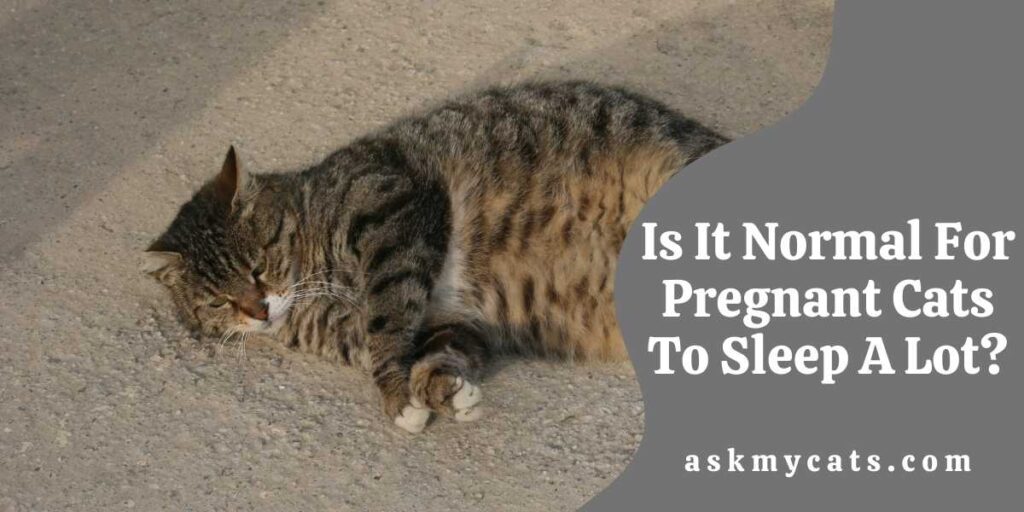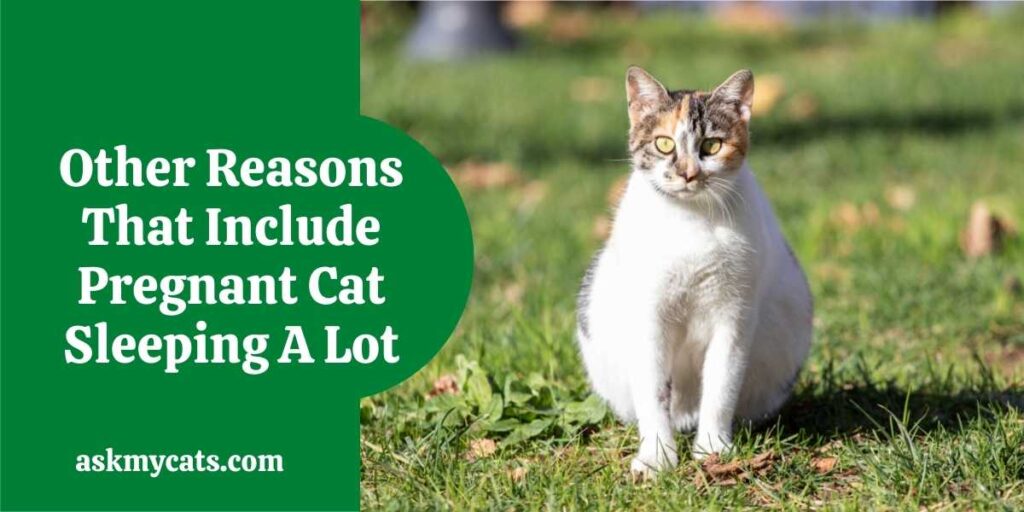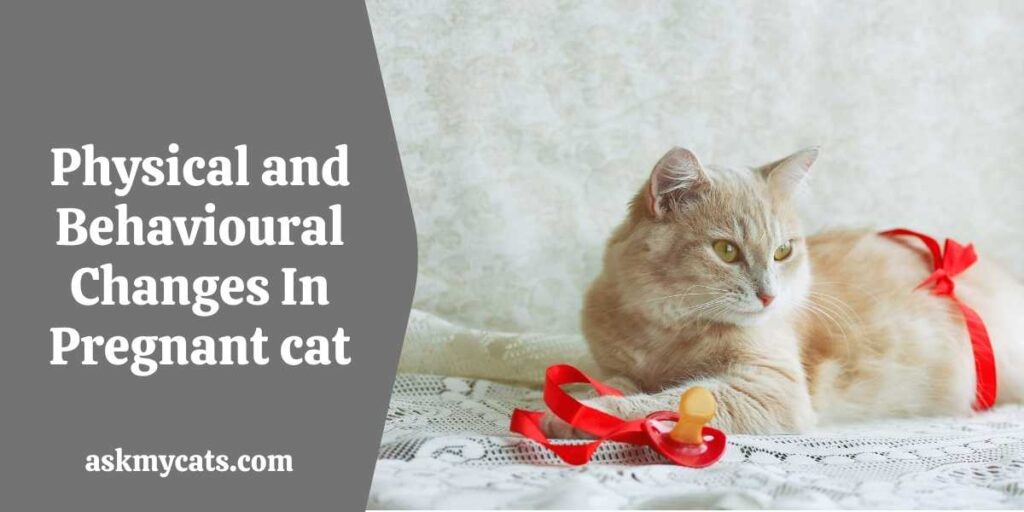When the winter ends, the cat world is up for the mating season. If female cats are not spayed when they enter puberty, which can happen as early as 4 months and last up to 18 months, they risk becoming pregnant if they meet an attractive male.
Cats’ gestation (or pregnancy) phase is relatively short, lasting approximately 8 to 9 weeks, or about 60 days. The female cat goes through a number of substantial morphological and behavioral changes during this time.
So, do cats sleep a lot during pregnancy?
Yes, pregnant cats do tend to sleep a lot. Many pregnant cats will sleep for longer periods of time than they did before they became pregnant.
This article will clear all your questions about increased cat sleep during pregnancy.


Give Your Cat the Perfect Day
Get the Free Ebook!
Is It Normal For Pregnant Cats To Sleep A Lot?
Yes, it is normal for pregnant cats to sleep a lot.

Cats normally have a gestation period of 63 to 67 days or approximately 9 weeks.
It could be a sign of cat pregnancy if you notice changes in your cat’s look or behavior, such as weight increase or napping more than usual.
You can always take your cat to the clinic if you see any of these changes in his or her behavior.
However, there are a few more indications and symptoms to check for before taking your cat to the veterinarian.
Other pregnant cat signs include increased appetite, loving behavior, nest building, and enlarged nipples, in addition to weight growth and increased sleeping patterns.
When your cat is pregnant, she will spend more time sleeping. It’s probable that your cat is pregnant if you observe her napping more frequently during the day.
Many pregnant cats will sleep for longer periods of time than they did before they became pregnant.
Cats that are pregnant or nursing are referred to as ‘queens,’ and they surely deserve it! She’ll begin to sleep more during the day, and she’ll look to have less energy and a desire to move.
When she’s awake, your queen may begin to act more maternal and needy, requesting more attention from you.
You may have a pregnant cat if you observe your cat rolling about on the floor and being really loud.
Also, check out do kittens move a lot before birth
Other Reasons That Include Pregnant Cat Sleeping A Lot
Other reasons that include pregnant cats sleeping a lot include: –

1. Cat Nap
If you think your pregnant cat sleeps too much, the main explanation is that 75 percent of the time a cat sleeps isn’t in a deep sleep condition.
Catnaps, which last anywhere from 15 to 30 minutes throughout the day, are your pet’s way of conserving energy for when food, prey, or a threat appears unexpectedly.
Your cat may appear to be resting most of the time, but she is always on the lookout and may jump and chase if it detects a sudden movement.
2. Lack Of Vitamins
Obesity is a highly likely cause of your pregnant cat’s excessive sleeping. Obesity in cats can be caused by a variety of factors, including an uneven diet and a lack of activity.
A pregnant cat should be fed three to four little meals per day on average. Feed him a high-protein, low-carbohydrate diet.
Some pregnant cats who are left alone for the majority of the day with unlimited food are more prone to gain weight.
Interesting Read: Pregnant Cat Eating A Lot: Reasons & Solutions
If you must be gone for an extended amount of time, use portion-controlled feeders to prevent your cat from overeating.
If your cat is an indoor cat, figure out how to get him some exercise. This may necessitate leash training or the provision of interactive toys for your cat.
3. Feline Depression
If your pregnant cat’s oversleeping is accompanied by additional symptoms like loss of appetite, avoidance, or other strange behavior, it could be a sign of depression.
Feline depression, on the other hand, is distinct from clinical depression in humans. This disorder might manifest symptoms similar to those listed above as a result of an underlying sickness.
In such instances, it’s advisable to take your cat to the veterinarian, who will do the appropriate tests to figure out what’s wrong.
4. Weather
Pregnant cats may be sleeping a lot more than usual due to the weather, believe it or not. It’s hardly unexpected that cat naps lengthen and become more common during the cold or rainy months.
The amount of light in your home has an impact on your cat’s sleeping patterns.
5. Viral/ Bacterial Infection
The most prevalent types of viral and bacterial diseases could be the cause of why your pregnant cat appears to be napping more than awake.
Viruses and bacteria can be spread through contaminated food, bite wounds, and contact with diseased cats or animals.
Feline immunodeficiency virus, feline herpes, feline leukemia, feline distemper, feline calicivirus, and other viruses commonly afflict cats.
Salmonella, E. coli, Bordetella, Helicobacter, Streptococcus, Leptospirosis, Clostridia, and other bacteria commonly infect pregnant cats.
Fatigue and lethargy are frequent indications of bacterial and viral illnesses, and they are often accompanied by other symptoms such as eye and nose discharge, diarrhea or loss of appetite, fever, weight loss, a lack of interest in grooming, and respiratory infections.
If your pregnant cat is exhibiting any of these concerning signs, you should see a veterinarian right once.
Must Read: Pregnant Cat Rolling On Back: Reasons & Solutions
Physical and Behavioural Changes In Pregnant cat
Some of the physical and behavioral changes in a pregnant cat are as follows: –

When cats are pregnant, their moods shift as well, but it’s more about feeling very, very affectionate than it is about feeling unhappy.
Cats require love and attention while they are pregnant. Your pregnant cat may act more maternal, meaning she purrs more and demands additional love and attention from you, according to experts.
If you observe this, give her additional cuddles! She’s going through a difficult period!
The fetuses of future kittens begin to grow fast between weeks 4 and 6 of a cat’s pregnancy. The mother-to-body changes dramatically as a result of this: her back hollows out, her pelvis widens, and her abdomen expands.
Your veterinarian may perform an x-ray from week 6 onwards to determine how many babies your cat is expecting.
He or she will be able to advise you on any necessary medication (for fleas, worms, and other parasites) to keep the mother from passing infections to her litter. It’s also crucial to feed your pregnant cat the correct food starting at week four.
Her energy requirements will rise, despite the fact that her larger tummy may make it difficult for her to absorb big amounts of food.
From week 4 until weaning is complete, feeding her dry cat food labeled for “pregnant or nursing cats” or “kittens” (which is richer) might assist meet her nutritional demands.
What Are The Signs Of A Cat Giving Birth Soon?
Nesting Activities: As the due date approaches, your pregnant cat may seek out peaceful, secret locations to give birth. This can start up to two days before labor, but it could start just a few hours before.
Restlessness: The pregnant queen may appear restless or nervous 24 to 48 hours before giving birth. She may enter and exit her nesting place in a pacing motion. The pregnant queen may meow and cry out more than normal, in addition to her pacing and restless behavior.
Lower Body Temperature: Your cat’s body temperature will drop below 100 degrees Fahrenheit within 12 to 36 hours of delivery (normal temperature is usually between 100.5- and 102.5-degrees Fahrenheit).
Frequently Asked Questions
How to prepare for a cat giving birth?
Provide your cat with a box or “nest” where she can give birth and care for her newborn kittens shortly before her due date. Make sure this birthing box is big enough for your cat and her litter, but also tall enough to keep any curious kittens out! Keep the nest warm by lining it with soft blankets or towels (that you won’t mind discarding). Try to put the box in a familiar location that is quiet and out of the way, and show your cat where it is.
What to do if a cat is sleeping a lot?
It’s not about understanding your cat’s typical sleep patterns and recognizing when that pattern changes significantly to suggest a health problem or health emergency; rather, it’s about knowing your cat’s normal sleep patterns and identifying when that pattern changes significantly.
If your cat starts sleeping a lot more or a lot less than usual, there could be a health problem, and it’s time to see your vet. Cats that start sleeping more than normal could be sick or in pain. If your cat begins to sleep more than usual, he or she could be suffering from hyperthyroidism or another disease.
Final Words
In the vast majority of cases, there is no need to be concerned if your pregnant cat sleeps a lot. However, in rare circumstances, the cat may be in pain or have an underlying medical condition, so it’s advisable to get medical advice from a veterinarian.
Ask us questions in the comments section if you have any.
